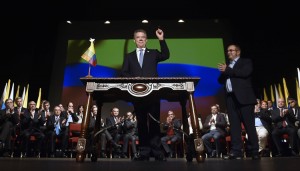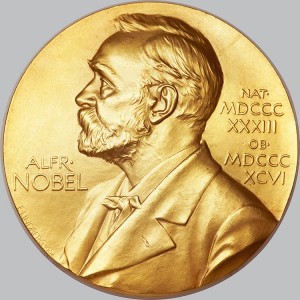Colombia: Peace at Last
Thursday, December 8th, 2016December 8, 2016
Last week, on November 30, Colombia’s Congress ratified a revised version of a historic peace deal between the government and the Revolutionary Armed Forces of Colombia (FARC), a guerrilla group with Communist ideals. The agreement officially ended more than half a century of civil war that claimed the lives of over 220,000 people and displaced millions of others. The ratification began a period of six months during which FARC is expected to disarm and form a political party. The government also faces the task of passing laws to implement provisions of the deal.

Colombian President Juan Manuel Santos prepares to sign a peace agreement ending decades of conflict with the Revolutionary Armed Forces of Colombia (FARC). The signing ceremony took place at the Teatro Colón in Bogotá, the capital, on Nov. 24, 2016. Credit: © César Carrión, GIS (Government Information System)
An original peace agreement, signed in September, was rejected by a small majority of Colombians in a referendum (direct public vote) held October 2. Opponents of this agreement, which was negotiated from 2012 to 2016, said it was too lenient on former FARC rebels. For example, it provided that guerrillas who confessed to crimes would not serve traditional jail time and guaranteed FARC representation in Congress for several years. Days after the referendum, Colombian President Juan Manuel Santos was awarded the 2016 Nobel Peace Prize for his efforts to end the civil war. In announcing the prize, the Norwegian Nobel Committee expressed its hope that the award would give Santos strength to continue the peace process.
Government and FARC representatives returned to the negotiating table to craft a revised deal as a fragile cease-fire kept the country peaceful. The government also consulted critics of the original agreement so it could take into account their concerns and reach an agreement with broader support. On November 12, the government and FARC announced they had reached a revised deal, which they signed on November 24. The new agreement was submitted to Colombia’s Congress for approval rather than subjected to a second referendum. The Senate voted 75-0 in favor of the deal on November 29, and the lower house approved it, 130-0, the next day. Legislators of the conservative Democratic Center party, led by former President Álvaro Uribe, boycotted both votes. Although the new agreement included dozens of changes, the political opposition maintained that it was too lenient and should have been subject to a referendum. Significantly divisive issues included the lack of conventional jail sentences and FARC’s participation in politics.
Lawmakers faced the challenge of implementing the agreement as quickly as possible, while thousands of armed FARC members remained in transition between guerrilla and civilian life. The killing of two FARC members by Colombian security forces on November 16, days after negotiators reached a final agreement, illustrated the necessity of a timely resolution.



